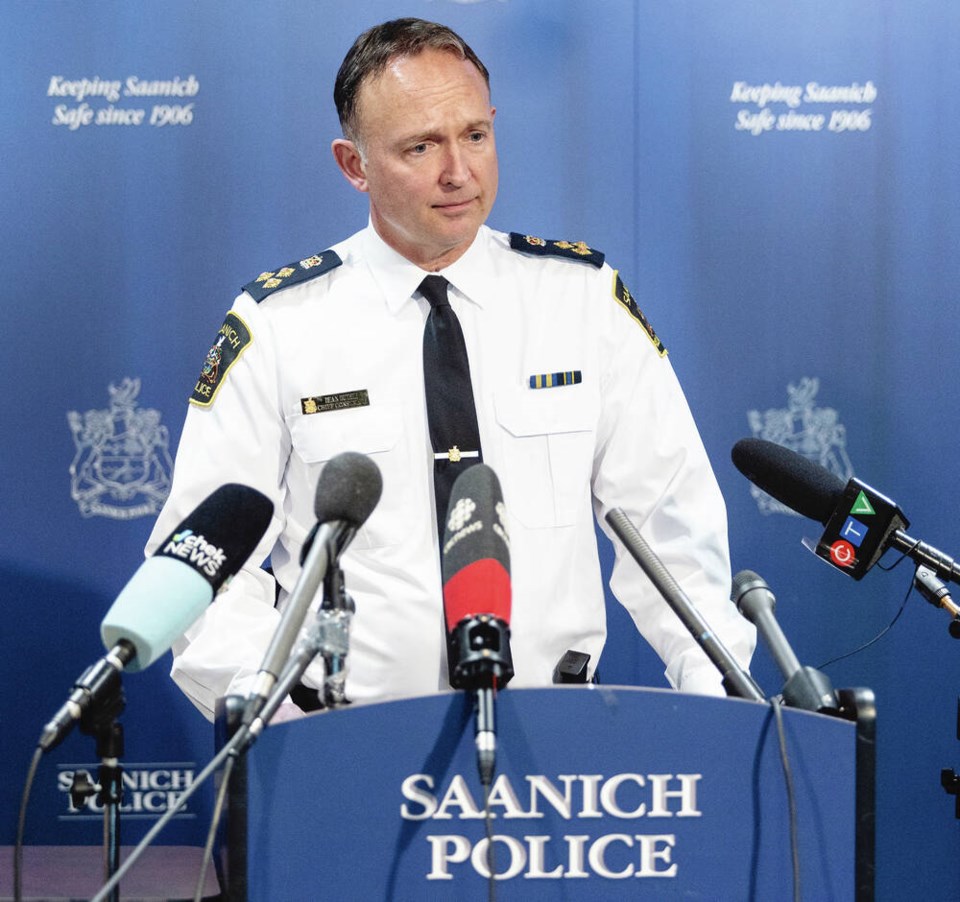The Greater Victoria School Board has voted unanimously to end its police officer school-liaison program, a move opposed by the Victoria and Saanich chiefs of police, who warned this week that gangs are recruiting in local schools.
The program had been under review by a special committee since November 2020.
Victoria police haven’t had school-liaison officers since 2018 due to budget problems, but Chief Del Manak has said he wanted the program to return. Saanich police had remained active in the program at 25 schools.
School board chair Nicole Duncan said trustees had to consider the “trauma and harm” that police presence can mean for some students, including those who are Black and Indigenous. The Greater Victoria School District said in a statement that the program has seen “many positive interactions,” but the board is committed to providing “trauma-informed support and inclusive spaces for all students.”
While the board is looking to end the program, Duncan said, it has directed the district’s superintendent to develop protocols “to ensure that, where it’s appropriate and necessary to have police involved in the goings-on at our schools, that we do so in a clear fashion.”
That can involve having police at schools for such things as emergencies, lockdowns or the assessment of threats, Duncan said. “We really want to continue to have a good and strong relationship with police when it’s appropriate to do so,” she said. “The police will continue to be our partners in raising awareness and providing the public with information around the risks of gang recruitment.”
She said the board’s mandate doesn’t include policing, “so we don’t have any ability to direct the work of [liaison officers] in our schools.” The work liaison officers do could be done by trained civilians, Duncan said.
Saanich Police Chief Dean Duthie called the school board decision “very disappointing,” noting that it ends decades of participation in the program by his department.
The decision effectively means the six officers who work full-time in the program will be immediately leaving their roles at 25 schools, Duthie said. “I met with our team [Thursday] morning and our officers are emotionally taken aback,” he said. “They’re upset at a deep level because they’re so committed and so passionate about their work with students, making a difference in their lives.”
Positive relationships that have developed are being lost, Duthie said. “It’ll essentially be removing police officers from schools on a daily basis, with the educational presentations they give, the informal engagements that happen, the drop-ins, the one-on-one discussion, the prevention talks about bullying, about online safety, about drug and alcohol awareness.”
He said the school-liaison program has been funded by police, although an exact amount was not available.
Duthie noted that a school-liaison program in 91原创 was cancelled and then brought back, an experience mirrored in other countries. “We are starting to see them one by one start to bring police back into schools, because they have experienced the difference that it makes and notice the harm that has increased.”
Duthie said the department has “a stack of correspondence” from students, parents and teachers expressing “whole-hearted” support for school-liaison officers.
Manak, a former school-liaison officer himself, said he can’t fathom why the board voted against the program. “Their decision seems so illogical,” he said. “It defies common sense. It’s a head scratcher.”
He said it also perpetuates old stereotypes of police and relies on studies that do not relate to local police agencies. “The police are part of the community. We are proactive. We build relationships,” he said. “Kids want to come out and sit in our police cars and they want to look at the lights at all ages, all the way from kindergarten to Grade 12.”
If some students are hesitant about police, that’s a good place to start a conversation, since their voices are important, Manak said.
Tracy Humphreys, who served on the committee looking into school liaison officers as president of the Victoria Confederation of Parent Advisory Councils, said the group put a lot of work into the decision. “I don’t feel like it’s a knee-jerk decision by any means,” said Humphreys, whose group represents 47 parent-advisory councils in the Greater Victoria School District.
“Parents are certainly mixed in their feelings about it.”
She said that in the wake of the decision, the board “can look at other creative ways to continue on the same type of programming where police have been supporting schools.”
“I do hope that parents will reach out to VCPAC if they do have concerns or things to say about it.”
>>> To comment on this article, write a letter to the editor: [email protected]



